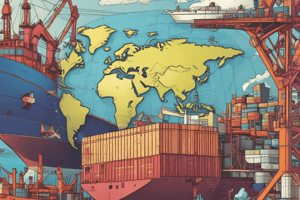Podcast
Questions and Answers
अंतरराष्ट्रीय व्यापार अर्थशास्त्र का एक महत्वपूर्ण पहलू है।
अंतरराष्ट्रीय व्यापार अर्थशास्त्र का एक महत्वपूर्ण पहलू है।
False (B)
अंतरराष्ट्रीय व्यापार में सामान, सेवाएं, पूंजी, विचार, और प्रौद्योगिकी का विनिमय होता है।
अंतरराष्ट्रीय व्यापार में सामान, सेवाएं, पूंजी, विचार, और प्रौद्योगिकी का विनिमय होता है।
False (B)
समुद्री ट्रेड एक प्रमुख फायदा है अंतरराष्ट्रीय व्यापार का.
समुद्री ट्रेड एक प्रमुख फायदा है अंतरराष्ट्रीय व्यापार का.
False (B)
प्रतिस्पर्धा में सुरक्षित अंतरराष्ट्रीय व्यापार के माध्यम से, मुकाबला करने के मौके कम होते हैं।
प्रतिस्पर्धा में सुरक्षित अंतरराष्ट्रीय व्यापार के माध्यम से, मुकाबला करने के मौके कम होते हैं।
प्रोत्साहन के माध्यम से, प्रतिस्पर्धा को बढ़ावा मिलता है, जिससे महंगे मुद्रा का सुनिश्चित होता है।
प्रोत्साहन के माध्यम से, प्रतिस्पर्धा को बढ़ावा मिलता है, जिससे महंगे मुद्रा का सुनिश्चित होता है।
प्रतिस्पर्धा में महंगी मुद्रा सुनिश्चित होने के कारण, अंतरराष्ट्रीय व्यापार को बढ़ावा मिलता है।
प्रतिस्पर्धा में महंगी मुद्रा सुनिश्चित होने के कारण, अंतरराष्ट्रीय व्यापार को बढ़ावा मिलता है।
अंतरराष्ट्रीय व्यापार के लाभों में एक समस्या यह है कि कुछ क्षेत्रों में कर्मचारियों को अस्थायी रूप से नौकरी से बाहर किया जा सकता है।
अंतरराष्ट्रीय व्यापार के लाभों में एक समस्या यह है कि कुछ क्षेत्रों में कर्मचारियों को अस्थायी रूप से नौकरी से बाहर किया जा सकता है।
विकासशील देशों या उनके कुछ क्षेत्रों का फायदा होना, अनुपातिक है पिछड़े हुए देशों के साथ।
विकासशील देशों या उनके कुछ क्षेत्रों का फायदा होना, अनुपातिक है पिछड़े हुए देशों के साथ।
चरम पर्यावरणीय संकुचन अत्यधिक कृषि उत्पादन, प्रोत्सहन गतिविधियों, और ऊर्जा उपभोक्ता से संबंधित है।
चरम पर्यावरणीय संकुचन अत्यधिक कृषि उत्पादन, प्रोत्सहन गतिविधियों, और ऊर्जा उपभोक्ता से संबंधित है।
साम्राज्यिकता में वृद्धि से स्थानीय परंपराओं और पहचान पर प्रतिभुति में कमी आती है।
साम्राज्यिकता में वृद्धि से स्थानीय परंपराओं और पहचान पर प्रतिभुति में कमी आती है।
निर्यात-आयात में प्रतिबंध प्रक्रिया में महत्वपूर्ण सुरक्षा हमेशा सहायक होती है।
निर्यात-आयात में प्रतिबंध प्रक्रिया में महत्वपूर्ण सुरक्षा हमेशा सहायक होती है।
नैतिक पुनर्रुपीकरण: मिश्रित संसाधनों पर अधिक सहारा होने के कारण महत्वपूर्ण क्षेत्रों में सामरिक पारंपरिकता में कमी होती है।
नैतिक पुनर्रुपीकरण: मिश्रित संसाधनों पर अधिक सहारा होने के कारण महत्वपूर्ण क्षेत्रों में सामरिक पारंपरिकता में कमी होती है।
Study Notes
Understanding Economics through International Trade
International trade is a critical aspect of economics that can influence global prosperity, competition, and cooperation among nations. It encompasses the exchange of goods, services, capital, ideas, and technology across borders, providing us with essential insights into how economies worldwide interact.
Definition and Importance of International Trade
International trade refers to transactions between countries involving the import and export of commodities, merchandise, capital, and services. While the concept might seem straightforward, its implications profoundly shape economic growth, wages, employment, and consumer choice globally. By promoting efficient resource allocation, specialization, and innovation, it enhances global welfare while fostering peace and understanding.
Advantages of International Trade
The primary advantages of international trade revolve around four central principles known as comparative advantage, division of labor, productivity gains, and market expansion:
-
Comparative advantage: Each nation focuses on producing those goods or services they have a lower opportunity cost compared to others, thereby maximizing efficiency and output.
-
Division of labor: Specialization allows each country's workforce to concentrate their efforts on specific tasks, increasing productivity per worker hour.
-
Productivity gains: As workers gain skills by competing internationally, innovation flourishes, leading to increased output and quality improvements.
-
Market expansion: Through trade, businesses access new consumers and markets, resulting in higher demand, profits, and potential job creation.
These benefits illustrate why free trade agreements, such as World Trade Organization membership, foster openness, competitiveness, and development opportunities for member states.
Challenges of International Trade
Despite the numerous advantages, several challenges arise from international trade. These issues often involve balancing national interests against multilateral commitments:
-
Structural unemployment: As sectors adapt to changing demands due to imports or exports, workers may face temporary layoffs in industries that cannot compete effectively.
-
Uneven distribution of income: Disproportionately benefiting developed countries or particular regions within developing ones.
-
Environmental degradation: Intensive agricultural production, extraction activities, and energy consumption linked to trade potentiates environmental damage if unchecked.
-
Cultural homogenization: Increasing reliance on imported cultural products diminishes local traditions and identity.
To address these concerns, governments implement various policies—such as subsidies, tariffs, quotas, and antidumping measures—to regulate trade flows and protect domestic industries. However, the efficacy of such interventions remains subject to ongoing debate.
In summary, international trade remarkably contributes to enhanced living standards, improved welfare, and elevated social mobility. Yet, policymakers must manage its complex dynamics prudently to avoid unfavorable outcomes for both individuals and communities at large.
Studying That Suits You
Use AI to generate personalized quizzes and flashcards to suit your learning preferences.
Description
Explore the key concepts, benefits, and challenges of international trade and its significance in shaping global economies and relations. Learn about comparative advantage, division of labor, productivity gains, market expansion, and the impacts on unemployment, income distribution, environment, and culture.




